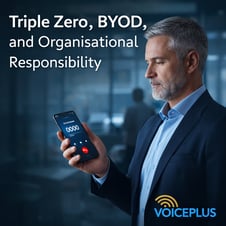23 January 2024

Enhancing Mobile Security: Insights from Scamwatch Reports
Mobile security has become a top concern for all of us. Scammers are constantly coming up with new tricks to target our mobile devices. The latest Scamwatch reports show that Australians lost over $455 million to scams in 2023, with phishing being the top scam tactic.
With most of our lives - in and outside of workplace settings - revolving around our mobile devices, it's essential to know how to enhance your mobile fleet's security. Here are some insights from Scamwatch reports that can help you better protect yourself against mobile scams.
The Threat Landscape
The threat landscape is constantly evolving, with scammers employing various tactics to exploit mobile device vulnerabilities. Phishing remains a prominent threat, with scammers using deceptive emails and messages to trick users into revealing sensitive information. Phone, social networking, and email are the top delivery methods for phishing scams, with the majority of scam victims being aged 55 and over.
Investment scams make up the largest category of losses, with scammers falsely promising high returns for investments. Other common scams include remote access scams, identity theft, and false billing scams. These tactics affect individuals and organisations alike, making it crucial for businesses to have robust mobile security strategies in place.
Best Practices for Mobile Security
Protecting your organisation's sensitive data begins with securing your mobile fleet. Here are some best practices to help you enhance mobile security:
- Implement strong password policies and require users to change their passwords regularly.
- Educate employees on identifying and avoiding phishing scams.
- Regularly update devices with the latest security patches and software updates.
- Set up remote wipe capabilities in case a device is lost or stolen.
- Use secure network connections when accessing sensitive information on mobile devices.
By following these practices, you can mitigate the risks of mobile scams and keep your sensitive data safe. Remember, cybersecurity is a shared responsibility, so empower your employees to spot and report any suspicious activities.
Protecting Your Mobile Fleet with Mobile Device Management (MDM)
Implementing a Mobile Device Management (MDM) solution is critical for securing and managing your mobile fleet. MDM allows you to remotely manage, monitor, and secure devices from a central console. You can enforce security policies, track device locations, and update software across all devices simultaneously. Additionally, MDM provides real-time insights into device usage and activity, allowing you to identify and address any security vulnerabilities promptly.
At VoicePlus, we offer integrated Mobile Device Management (MDM) services through our Atrium platform. With Atrium, you can streamline the management of your mobile fleet and improve your organisation's overall security posture.
Importance of Communication in Mobile Security
While implementing security measures and having robust technology solutions are critical, effective communication is equally important. Ensure that employees are aware of your organisation's mobile security policies and understand the potential risks associated with their devices. Conduct regular training sessions to educate employees on how to protect sensitive data while using their mobile devices.
By fostering a culture of open communication and educating employees, you can enhance secure behaviour and reduce the likelihood of mobile security breaches.
Common Scam Examples
Below are some common scam examples that can impact your organisation's mobile fleet:
- Phishing Messages: Scammers send deceptive messages impersonating trusted entities, such as banks or government agencies, to trick users into revealing personal information.
- Tech Support Scams: Victims receive fake tech support calls or messages, claiming their device is infected. Scammers offer to fix the issue for a fee or gain remote access to the device.
- Smishing (SMS Phishing): Scammers send fraudulent text messages with malicious links or requests for personal information.
- Fake Apps: Malicious apps mimic legitimate ones, luring users to download and provide sensitive data.
- Robocalls: Automated calls claiming to be from reputable organisations, aiming to obtain personal details or financial information.
- Identity Theft: Scammers steal personal data to commit identity theft, potentially causing severe financial and reputational damage.
By staying informed and educating employees about these common scams, you can enhance your overall mobile security posture and reduce the risk of falling victim to fraudulent activities. Stay proactive and prepared in the face of evolving mobile threats.
Final Thoughts
Mobile security is an ongoing battle that requires a proactive and multi-layered approach. By following best practices, implementing a robust MDM solution, fostering open communication, and staying informed about common scams, you can better protect your organisation's sensitive data.
Remember, it only takes one weak link to compromise the entire security of your mobile fleet. For more information on how VoicePlus can help you secure your mobile devices, contact us today.
3 Strategies to Reduce Telecom Cost




